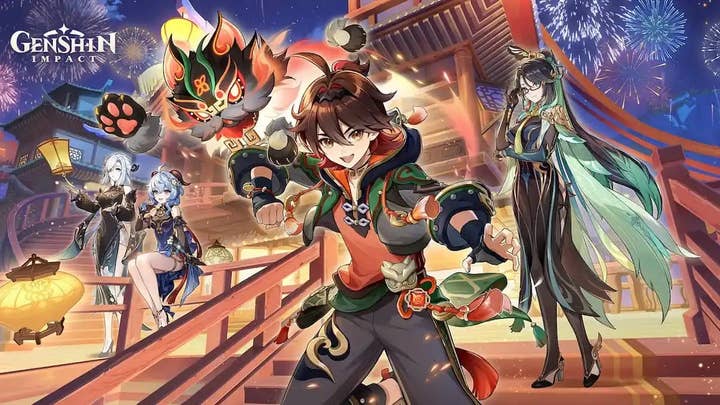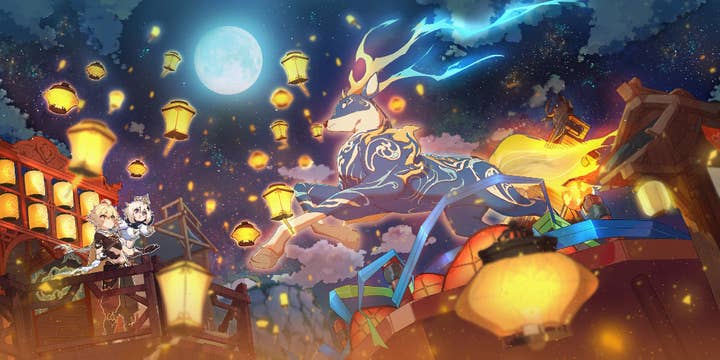Genshin Impact's protesting players aren't just "entitled gamers" | Opinion
Protests against underwhelming in-game rewards should be treated as valuable feedback on a monetisation strategy gone awry, not as ingratitude or entitlement
The games business experiences more than its fair share of controversies, but there's been a clear front runner in the controversy stakes over the past decade or so, and that's free-to-play games.
Though they're now firmly part of the landscape, and quite a few of the most successful games of the past years have used F2P business models, there's still a vocal group of consumers who are rubbed in all the wrong ways by this model.
It doesn't help that many early F2P games were pretty much exactly as exploitative as critics claimed – and even as well-crafted F2P games with thoughtful, generous monetisation schemes have become much better exemplars of the model than the thinly veiled Skinner Boxes of the past, it's been hard to shake those slightly grubby associations in many people's minds.
Consequently, discussions about what's happening in the F2P space often end up being circular and unproductive; it's tricky to talk about the specifics of what's going right and wrong with these business models without getting bogged down in a tired debate over their more general merits.
Take for example the week's biggest controversy in the F2P market – a "revolt" by Chinese players of Genshin Impact, who felt slighted by a poor offering of in-game rewards for the game's Lunar New Year event and have responded by unfollowing its social media accounts en-masse, review bombing the game, and even taking out their displeasure on the social media accounts of companies like Pizza Hut and KFC which have formerly done marketing tie-ups with Genshin.
Much of the response to reporting of these player protests has fallen into two broad camps – mocking the players for being invested in a gacha game in the first place or berating them for "entitled gamer" behaviour. Neither of these responses is constructive or insightful, and what's happening here is actually a pretty interesting case, not least since it's a rare misjudgement by a company that's emerged as a real leader in this market.
To give a little context, MiHoYo is a Shanghai-based company which was founded in 2012 and is now pretty consistently the top-grossing firm in the "gacha" market.
Genshin Impact, which launched in late 2020, is the biggest-grossing mobile game in the world in most months (it also has PC and PlayStation versions, with its console exclusivity on Sony platforms being a pretty major coup for Sony). A newer game, Honkai: Star Rail, launched last year and also hovers near the top of the top-grossing chart.
Each of these games comfortably turns in tens of millions of dollars of revenue per month on mobile platforms alone. Genshin Impact is an open-world action RPG that drew inspiration from Breath of the Wild (it was accused of being a clone of Nintendo's game at the outset, although aside from some traversal features like a hang-glider and a stamina bar for climbing, it's a very different game), while Honkai Star Rail is more like a turn-based JRPG. But both games share a lot of DNA in the mechanisms of how characters and weapons are acquired and levelled up.
Both games are impressive achievements technically, especially for mobile titles, and Genshin Impact in particular has an enormous amount of open-world content. None of the game's areas or quests are gated behind any payment – the entire game can be played without paying anything, although at the other extreme, players who want to build teams of powerful five-star characters can easily spend thousands of dollars on the randomised gacha system in the process.
So why are the game's Chinese fans in uproar? The specific trigger was a relatively throw-away announcement tacked on to a long video outlining the game's plans for the Lunar New Year, which includes a major new content update encompassing a variety of new free features and additions, as well as new additions to the premium gacha system.
The use of terminology like "gift" and "reward" is a powerful psychological tool, but it's quite dishonest at the heart of it
Genshin will give out some free "intertwined fates" – items that grant players one "pull" from the randomised gacha system – as part of the New Year celebrations. At the end of the announcement, they also said that players will be given three of these items in recognition of their loyalty to the game over the past year.
It's not entirely surprising that this "gift" of three pulls would be taken by players as a bit insulting; to put it in context, getting a desired five-star character in the game can take up to 90 or even 180 pulls, so this really is quite a meagre number to offer as a loyalty reward.
Still, that might be worth an eye-roll; it's hard to see how it's worth the level of outrage, especially given that it's offered on top of various other freebies in the New Years period. You can see where the "entitled gamers" response is coming from; there's certainly a whiff of that in this behaviour, at least taken at face value.
It's worth noting, though, that the idea that developers are giving players "gifts" by granting them these sorts of items in F2P games – and that they should therefore be grateful rather than "entitled" – is inherently mistaken, and reflects a very poor level of understanding of how these games work.

Giving players premium currency (which is essentially what these "pull" items amount to) is not a gift; it is a marketing and player retention strategy. The developer is trying to get players used to spending premium currency, so that they'll be more inclined to buy more of it in future. The key is striking a balance such that premium currency isn't so easily obtainable that players never feel the need to buy any, but also that it isn't so rare that players find themselves loath to spend it freely.
Giving away a bunch of premium currency is an effort to find that balance in the system, not a selfless act of generosity. It's also often designed to encourage lapsed players to log back in, or to give a FOMO incentive for new players to join the game before the time-limited offer expires.
The use of terminology like "gift" and "reward" is a powerful psychological tool, but it's quite dishonest at the heart of it – these offers are just part of ordinary functioning of the game's economy and monetisation model, and players are neither under any moral obligation to be "grateful" for a marketing strategy, nor to refrain from criticism if they feel that the game's monetisation model is veering towards being stingy and unappealing.
Entitled gamers are a real phenomenon in many cases – there are lots of people out there who can't wrap their heads around the notion that being a fan of something doesn't make its creators beholden to your whims – but a player backlash to an aspect of a game's monetisation system isn't entitlement, it's a nice clear economic signal that your price discovery has gone awry and you've miscalculated your market's tolerances.
As ever, the backlash isn't really about the widely-reported inciting event; that's just the straw that broke the camel's back. Genshin's Chinese players aren't just mad about being offered a slightly insulting "reward"; there has been long simmering disquiet over its monetisation system, which is quite light-touch in some ways (as mentioned, you can comfortably complete all of the game's content without paying anything), but which does demand a pretty eye-watering amount of money from players who want to add specific characters to their rosters.
Players aren't just mad about being offered a slightly insulting "reward"; there has been long simmering disquiet over [Genshin's] monetisation system... which does demand a pretty eye-watering amount of money
An interesting factor here is MiHoYo's newer game, Honkai Star Rail, has become a focal point for player unrest, with that game's much more liberal and generous monetisation system (which recently included giving all players a free copy of a powerful new character) being constantly compared to Genshin Impact's relatively aggressive and tight-fisted monetisation.
This is a key point – Genshin's fans didn't get mad because they object to an inherent aspect of the gacha business model (on the contrary, they like and appreciate that model overall), but instead because they looked at the business models of similar games, including those from the same developer, and felt that the specifics of Genshin's offerings are unappealing by comparison.
The trigger incident was an example of poorly considered communication from the developer (framing something in grandiose terms as a reward for year-long loyalty and then delivering a near-meaningless token is a textbook case of over-promising and under-delivering), but the underlying dissatisfaction that drives it arose simply because players are perfectly capable of comparing and contrasting games' business systems and monetisation, and have a strong sense of fairness about how those systems differ from game to game.
MiHoYo has said that it is reconsidering the Lunar New Year event rewards in light of the backlash, and it's unlikely that this will turn out to be anything more than a minor bump in the road of Genshin Impact's enormous success – but it's an example of how our framework for discussing F2P and gacha mechanisms needs to be more nuanced and specific, and I'd argue that it's a case where people have been much too quick to apply the "entitled gamers" counter-argument.
MiHoYo are the undisputed masters of this type of game, and Genshin Impact is an extraordinary achievement in many ways; but the process of balancing game design, monetisation design, and player communication for an enormous game across multiple cultures is a very complex one, and even the masters slip up sometimes – and for everyone else in the market, there are valuable lessons to be learned when they do.
Sign up for the GI Daily here to get the biggest news straight to your inbox



